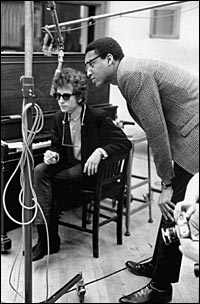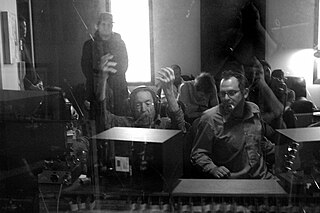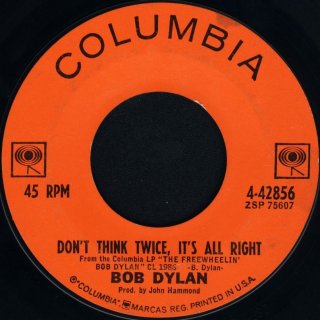
The Times They Are a-Changin' is the third studio album by the American singer-songwriter Bob Dylan. It was released on February 10, 1964, through Columbia Records. Whereas his previous albums, Bob Dylan (1962) and The Freewheelin' Bob Dylan (1963), combined original material and cover songs, this was the first to feature only original compositions. The album consists mostly of stark, sparsely arranged ballads concerning issues such as racism, poverty, and social change. The title track is one of Dylan's most famous; many feel that it captures the spirit of social and political upheaval that characterized the 1960s.

Thomas Blanchard Wilson Jr. was an American record producer. He is best known for his work in the 1960s with artists such as Bob Dylan, Frank Zappa and the Mothers of Invention, Simon & Garfunkel, the Velvet Underground, Cecil Taylor, Sun Ra, Eddie Harris, Nico, Eric Burdon and the Animals, the Blues Project, the Clancy Brothers and Tommy Makem, and others.
"Chimes of Freedom" is a song written and performed by Bob Dylan and featured on his Tom Wilson produced 1964 album Another Side of Bob Dylan. The song depicts the thoughts and feelings of the singer and his companion as they shelter from a lightning storm under a doorway after sunset. The singer expresses his solidarity with the downtrodden and oppressed, believing that the thunder is tolling in sympathy for them.

The Bootleg Series Vol. 6: Bob Dylan Live 1964, Concert at Philharmonic Hall is a live album by Bob Dylan, released in 2004 on Legacy Records. It is the fourth installment of the ongoing Bob Dylan Bootleg Series. The album is the complete recording from the October 31, 1964 "Halloween" show at Philharmonic Hall in Manhattan by Bob Dylan.

The Byrds Play Dylan is the name of two different compilation albums by the American rock band the Byrds, one released in 1979 and the other issued in 2002. As their titles suggest, each compilation consists of interpretations of Bob Dylan penned songs, which the Byrds recorded at different stages of their career.

Donald William "Bob" Johnston was an American record producer, best known for his work with Bob Dylan, Johnny Cash, Leonard Cohen, and Simon & Garfunkel.

"Don't Think Twice, It's All Right" is a song written by Bob Dylan in 1962 and released the following year on his album The Freewheelin' Bob Dylan and as the B-side of the single "Blowin' in the Wind". The song has been covered by several other artists, including Waylon Jennings in 1964, Susan Tedeschi, Emilie-Claire Barlow in her 2010 album The Beat Goes On and Peter, Paul and Mary, who released it as a single, which reached the Top 10 of the Billboard Hot 100.
"Ballad of Hollis Brown" is a folk song written by Bob Dylan, released in 1964 on his third album The Times They Are A-Changin'. The song tells the story of a South Dakota farmer who, overwhelmed by the desperation of poverty, kills his wife, children, and then himself.

Bob Dylan is an American singer-songwriter. Considered one of the greatest songwriters of all time, Dylan has been a major figure in popular culture over his 60-year career. With an estimated figure of more than 125 million records sold worldwide, he is one of the best-selling musicians of all-time. Dylan added increasingly sophisticated lyrical techniques to the folk music of the early 1960s, infusing it "with the intellectualism of classic literature and poetry". His lyrics incorporated political, social and philosophical influences, defying pop music conventions and appealing to the burgeoning counterculture.

"The Times They Are a-Changin'" is a song written by Bob Dylan and released as the title track of his 1964 album of the same name. Dylan wrote the song as a deliberate attempt to create an anthem of change for the time, influenced by Irish and Scottish ballads. Released as a 45-rpm single in Britain in 1965, it reached number 9 on the UK Singles Chart. The song was not released as a single in the US. In 2019 it was certified Silver by BPI.

The Times They Are a-Changin' was a 2006 dance musical featuring the songs of Bob Dylan, conceived, directed and choreographed by Twyla Tharp.

Odetta Sings Dylan is an album by American folk singer Odetta, issued by RCA Victor in 1965. It consists of covers of Bob Dylan songs.
"With God on Our Side" is a song by Bob Dylan, released as the third track on his 1964 album The Times They Are A-Changin'. Dylan first performed the song during his debut at The Town Hall in New York City on April 12, 1963.
"One Too Many Mornings" is a song by Bob Dylan, released on his third studio album The Times They Are a-Changin' in 1964. The chords and vocal melody are in some places very similar to the song "The Times They Are A-Changin'". "One Too Many Mornings" is in the key of C Major and is fingerpicked.
"Restless Farewell" is a song by Bob Dylan, released as the final track on his third studio album The Times They Are a-Changin' in 1964. Dylan’s song is based on the Scottish/Irish folk song "The Parting Glass."

The Bob Dylan England Tour 1965 was a concert tour by American singer-songwriter Bob Dylan during late April and early May 1965. The tour was documented by filmmaker D. A. Pennebaker, who used the footage of the tour in his documentary Dont Look Back.

"Lay Down Your Weary Tune" is a song written by Bob Dylan in 1963. Dylan originally recorded it for his album The Times They Are a-Changin', but his version of the song was not officially released until 1985 on the Biograph box set. In the album liner notes, Dylan claims that in the song he was trying to capture the feeling of a Scottish ballad he had just heard on a 78 rpm record. The specific ballad Dylan was referring to has not been identified, but speculation includes "The Water Is Wide", "O Waly, Waly" and "I Wish, I Wish".
"Only a Pawn in Their Game" is a song written by Bob Dylan about the assassination of civil rights activist Medgar Evers in Jackson, Mississippi, on June 12, 1963. Showing support for African-Americans during the American Civil Rights Movement, the song was released on Dylan's The Times They Are a-Changin' album in 1964.

Chimes of Freedom: The Songs of Bob Dylan Honoring 50 Years of Amnesty International is a charity compilation album featuring new recordings of compositions by Bob Dylan by multiple artists, released on January 24, 2012. Proceeds from the album were donated to the human rights organization Amnesty International. It debuted in the U.S. at number 11 on the Billboard 200 with 22,000 copies sold while the 2-CD version available at Starbucks debuted at number 38 with more than 10,200 copies sold.
With God on our side may also refer to:












